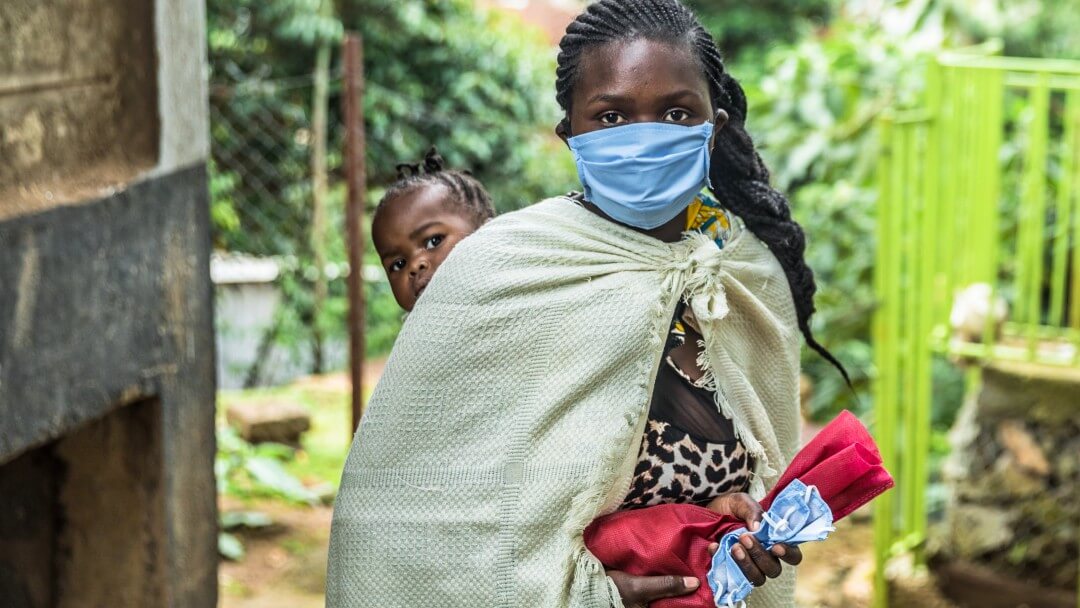
The world is not on track – in the fight against hunger
KfW Development Bank event in cooperation with Welthungerhilfe
Over the past 20 years, the global community has made significant progress in reducing hunger. However, this did not happen fast enough for there to be a prospect of eliminating it in the foreseeable future. And now, COVID-19 is threatening to reverse this positive trend. What is the best way to continue the fight against hunger during the pandemic? This was the subject of a virtual podium discussion held by Welthungerhilfe in cooperation with KfW to mark the release of this year’s Global Hunger Index.
Mathias Mogge, Secretary General of Welthungerhilfe, has calculated that 690 million people are still going hungry. 144 million children have stunted growth, 47 million children suffer from emaciation and the latest figures indicate that 5.3 million children under the age of five are dying each year as a result of undernutrition. In 11 nations, including many sub-Saharan countries like Chad, the Central African Republic, Somalia and Madagascar, the situation is alarming. In a further 40 countries, it is serious. “If things carry on as they are, at least 37 countries will not achieve the target of ‘zero hunger’ by 2030,” comments Mogge.
What is more, these figures date from before the pandemic. It appears, therefore, that coronavirus will exacerbate the situation. Ertharin Cousin, agriculture expert and visiting scholar at Stanford University, said in a keynote address that without prompt aid, 130 million more people would go hungry by the end of this year. She quoted the World Bank’s prediction that sub-Saharan Africa will experience its first recession in 25 years and that Latin America will see the worst economic decline since growth rate records began.
COVID-19, as Cousin said, has once again exposed the weaknesses in our global food system: it is neither fair nor sustainable. “This makes it all the more important that we act fast and decisively now, at all levels and across all sectors,” states Cousin. And to do so will require considerably more funds: recent studies show that developing countries and emerging economies require an additional EUR 14 billion per year. That would be equivalent to doubling the international funding to date.
Countries should not “social distance” from each other
KfW Managing Director Barbara Schnell also used her welcoming remarks to express the view that the pandemic has demonstrated, more than ever, that “global challenges require international cooperation.” Social distancing plays an important role in containing the pandemic. “But countries must not distance from one another. And it cannot be allowed to become a determining factor in foreign and security policy.” COVID-19 requires joint action with a comprehensive “One Health” approach that views the health of humans, animals and the environment as one unit and situates sustainable agriculture within this broader context.
In spring, KfW launched a comprehensive EUR 5 billion coronavirus special programme on behalf of the German Federal Government that provides both short-term aid, such as medical equipment, and long-term support for health, agrarian and food systems.
Lively debate about the best route to take
After the welcoming remarks, the keynote speech and the presentation of the Global Hunger Index’s new hunger figures, a lively debate began regarding the best way to lessen the negative impact of COVID-19 on the global food situation. Participants included Professor Sabine Gabrysch from the Charité hospital in Berlin, Cornelia Berns, a Director at the Federal Ministry of Food and Agriculture, and Ursula Langkamp, Welthungerhilfe’s Country Director for Sierra Leone.
The three speakers covered a wide range of aspects, but all agreed that the existing food system in its current form is not working: too unfair, too unequal, not environmentally friendly enough and insufficiently aligned to the needs of the poor and smallholders. Overall, the experts called for greater promotion of smallholders. They must become more productive, and to do so, they will need appropriate tools, clear land use rights and better access to markets, supply chains and financial services and, ultimately, fair prices for their products as well. This will require action from governments.
What is more, and this was discussed in detail, a healthy diet needs more than basic foodstuffs like rice, wheat or corn. It can only be balanced if it includes vitamins, proteins and nutrients, for example through fruit, vegetables, nuts and seeds. Calories alone are not enough. In order to supply this variety, it is advisable to ensure diversity of plant species and cultivation methods. Only with this approach, and with more productive smallholders, will it be possible to achieve the goal of providing everyone with enough healthy food.
Everyone bears responsibility
Hunger, however, is not just something that happens in other parts of the world: it is directly linked to everyone, including those in richer countries, as various speakers noted. The price we pay for groceries, the amount of food we waste, how much meat we consume, whether we buy local – all of these factors impact the complex global food production system. “Everyone bears responsibility” was the message here.
The President of Welthungerhilfe, Marlehn Thieme, echoed this sentiment at the end of the event, concluding that hunger does not occur in isolation. Rather, “peace, hunger, alleviating poverty, climate protection and health go together.” The pandemic has provided another dramatic example of the connections between these elements.

